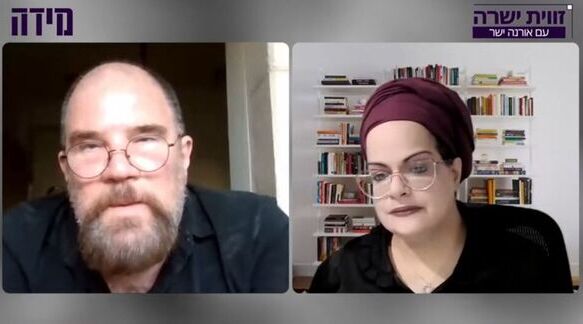Yisrael Hayom's tactic of free paper distribution is widely practiced – including by Yediot, the rival trying to shut it down.
The law aimed at 'protecting competition' in the newspaper business is in fact an attempt to legally enforce monopoly and eliminate a politically undesirable rival • Furthermore, far from being a nefarious and unhanded tactic, free distribution is a legitimate market tactic practiced throughout Europe by many • This law must not pass, for the good of Israeli democracy

A personal declaration is required before we begin: Neither I nor any charity or organization with which I am actively affiliated receives any benefit from Yisrael Hayom, its owners, or its publishers. It would be most reassuring to all of us if the backers and supporters of this draconian legislation discussed below were able to make the same statement with regard to Yediot Aharonot, its owners and publishers.
The new legislation is called, "The Law to Advance and Protect the Printed Press in Israel". The law's official explanation states that its purpose is to eliminate "one of the major causes of the crises in the printed newspaper industry which [also] prevents it from reviving itself – the absence of decent competition based on editorial excellence because of the free distribution of newspapers".
Sounds good: competition, editorial excellence, strengthening the free press. But in truth, this is a law designed to achieve the exact opposite – to eliminate competition and restore the Yediot Aharonot newspaper to its former glory, earning monopolistic profits for its well-connected owners.
The law is written in general terms, of course, but it will have one, solitary effect: it will prohibit Yisrael Hayom from continuing to distribute its popular paper without charge. Each day, about 40% of the Israeli public reads or is exposed to this newspaper, and this law is designed to deny them this right. The competing Yediot Aharonot, read by about the same number of people, would of course be the major beneficiary of this brazen interference in the free market – all in the name of "returning the market to decent and democratic competition".
This is truly an astounding effort to interfere with free enterprise and to stack the deck in favor of a particular newspaper owned by a particular and powerful media family with a particular political agenda. It is a classic "personal law" – an unlawful attempt to inflict forfeiture of rights and/or property without judicial process.
While the major objective behind this act may be economic gain for the powerful owners of Yediot, the effort has also garnered political support. Thus, Justice Minister Tzippy Livini justified her enthusiastic backing of this anti-democratic forfeiture on the grounds that Yisrael Hayom consistently supports Bibi Netanyahu so that the daily publication of the newspaper amounts to unregulated political financial support. She explained that while she had to print advertisement circulars during the last election campaign, Mr. Netanyahu received the equivalent without cost through Yisrael Hayom's dedicated support. This argument is particularly interesting because a study conducted by Moran Rada with the Israeli Democracy Institute showed that Yedioth Aharonot's coverage of the 2009 Israeli legislative election was biased in favor of Kadima and its leader Tzipi Livni in most editorial decisions. Apparently things are different when you get the free press coverage.
Some of the supporters of this proposed law also see it as a means of attacking and undermining the influence of the publisher of Yisrael Hayom, Sheldon Adelson, objecting to his political views or to his charitable pursuits. But the main body of political fellow travelers consists of anti-Netanyahu advocates who object, like Livni, to the paper's support of his public and foreign policies. The motive is understandable, but the proposed targeted economic assassination is unprecedented in any democracy.

Declining newspapers and monopolies
I cannot find a single instance of a democratic government outlawing an existing newspaper because of its marketing strategy. Freedom of enterprise would prohibit the elimination by government legislation of any legal business, even one unrelated to the core democratic interests of freedom of the press and the right of the public to read whatever it wants. To outlaw a newspaper in a democratic society governed by laws and not people is repugnant.
Daily newspapers all over the world, including in Israel, are in steady decline. The reason, of course, is the advent of the internet. Most people under 30 derive their news exclusively from the internet, primarily from internet publications but also from the free newspaper content distributed by almost all print newspapers, including the Israeli Yediot Aharonot and its competitors here in Israel. In Israel, the decline of profitability is primarily a result of consistent reduction in the advertisement rates. And it is no coincidence that the narrowly held ownership of the newspapers includes strong interests connected to the world of advertising which push to lower the rates.
The Yediot owners also own one of the most widely read internet news sites (Ynet), one of the most successful TV broadcasters (Reshet), and part of Israel's only cable company, HOT. But their print newspaper is slipping steadily. For many years, (starting first in 1995) Yediot Aharonot was so predominant that it had officially been ruled a monopoly. It was truly the "paper of the nation" and its power over politicians was legendary. Moreover, the entire newspaper "industry" was an oligopoly ruled by a few powerful families who made sure that the price of entry of new competition remained prohibitive (sound familiar?). This close control of what in pre-internet times was the primary source of the public's information troubled legal scholars, such as Professor Aharon Barak (later to be Supreme Court President) who wrote scholarly articles warning that such close control over what the public reads can be detrimental and even dangerous to democratic governance.
But with the publication of the new and free Yisrael Hayom, and with the broad access to free content on the internet, this monopolistic power eroded, so that now Yediot is fighting strenuously to maintain a position as the most widely read newspaper in the country. Indeed, one of its tactics is free distribution! I, for one, am given a free copy of Friday's Yediot each week at the Machane Yehuda in Jerusalem. Competition is like that.

Free distribution for me, but not for thee
Yediot knows very well how free distribution can overtake a leading competitor. For that is precisely what it did in in 1960's to wrestle the leadership from the previously dominant Maariv. Yediot gave out hundreds of thousands of free newspapers and it ultimately toppled Maariv. But now, it is struggling to defend its turf not expand it. What it did to Maariv in the 60's is being done to it by Yisrael Hayom and the internet in the 2000's. As it is slowly losing the battle, a new and drastic strategy is required, and there is no conceivable solution better than to have the government outlaw the competitor. This is a monopolist dream come true.
Free newspapers are neither the invention of Yediot Aharanot and the Moses family (its primary owners) nor of Yisrael Hayom and the Adelsons. This marketing strategy started back in 1940, and is widely prevalent in today's world. There are two elements to newspaper income: the yield from selling papers and the payments for advertisements in the paper. The marketing strategy of free distribution is to increase the advertising revenue at the cost of distribution income. The advertising rates (and therefore income) are directly related to circulation. So by reducing cost to the consumer, the paper increases circulation and increases advertising revenues.
This strategy is very widespread in Europe where about one out of five newspapers read by the public is distributed free (an average of three newspapers per country). This is the model of the internet where there is no cost for reader access and the publisher's income is based solely on advertising. But a free market, when not cannibalized by government intervention, is dynamic, and there is a discernible trend by internet newspapers to begin charging for some access (e.g., Haaretz in Israel, The Wall Street Journal and New York Times in the States, and the Guardian in Great Britain). There has also been a reduction in the number of newspapers freely distributed over the past few years.
The classic success story of the free distribution market strategy is the London Evening Standard. After 182 years of charging for its paper, the publisher decided in 2009 to distribute it free. As a result, it became the most widely circulated paper in London and the fourth largest in all Great Britain. In 2009, the paper was on the verge of closing (losing about ₤30 Million per year) but it turned profitable in just three years.

A blight on democracy
The new law, designed to eliminate the Yediot's competition seeks to portray the free distribution marketing strategy as some nefarious act, some untoward, heavy handed, anti-democratic bludgeon. This is blatant nonsense. Free distribution is one among many possible legitimate marketing strategies. Can anyone imagine that it would even cross the mind of a member of the English Parliament to try and outlaw the London Evening Standard because of its success?
I have no doubt that the proposed law, if passed, would be struck down by the Supreme Court. It fails each of the tests which the Court has devised to disqualify Knesset laws which it deems "unconstitutional". The law is not for a worthy purpose and in fact is a personal law, a bill of attainder aimed at one successful publisher with the wrong political views. The law is clearly overkill and not proportional, even if one were to accept its fallacious economic premises. The law is not effective and exceeds the necessary scope. The social cost is ruinous as its injury to freedom of the press, to the requisite respect for property, and to the freedom of enterprise far exceeds the supposed danger to newspaper competition-even if there were such a danger (and there is not).
The Knesset has an obligation to act for the public interest. For those of us who object to the excessive judicial activism whereby the courts become the arbiters of what is appropriate for israel and what is not, it is especially important that the Knesset exercise its own mature judgment and make these determinations. This is crucial in our parliamentary system if the Knesset is to remain the ultimate sovereign authority.
This proposed law to "advance and protect the printed press in Israel" is bad law, strangles freedom of the press, makes a mockery of market competition and serves untoward private economic interests. It is a blight on our Knesset and on our democracy.
Mr. Golovensky practices law in Israel and the US. He is Founding President of the Institute for Zionist Strategies.
To receive updates on new articles in English, join Mida on Facebook or Twitter or join our mailing list.




